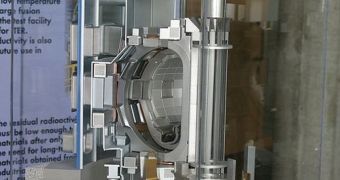According to officials, it may be that the International Thermonuclear Experimental Reactor (ITER) facility will be opened for business come 2019. This is a significant delay from the originally-planned opening date, which was scheduled for 2016. It was pushed back by two years, to 2018, some time ago, and now managers for the project announce the new extension. The 10-month delay was decided upon at a late February meeting between all the heads of the delegations involved in the international project. The meet-up took place in Paris, and all those involved agreed to the decision, ScienceNow reports.
The announcement about the ITER opening date was made on Monday during a meeting by the director of the US Department of Energy's (DOE) Office of Science, William Brinkman. The enormous tokomak will be the product of a collaboration between countries in the European Union (which also supplies the largest portion of the funds for the machine, as well as the building location), the United States, the Russian Federation, China, Japan, South Korea and India. At this point, it is estimated that work on the reactor, which is scheduled to begin shortly, will cost anywhere between 5 and 10 billion euros. In spite of many attempts, a fixed price tag could not be attached to the initiative.
All the actors involved in funding ITER are currently alarmed by the way in which the project is heading. They are not too pleased with the fact that cost estimates continue to rise, while delays in actually getting things done continue to mount. The costing system and the project management were the target of a recent investigation that members ordered, and insiders say that the conclusions of the review panel were “very negative.” It was found that the central organization managing ITER does not have sufficient authority over the seven Domestic Agencies involved from each partner.
This means that it cannot accurately coordinate the entire project in a flawless manner. Additionally, the European Union, as a host to the reactor, insists that more time be allotted to the construction phase so as to eliminate any potentially-devastating technical oversights on part of the builders. French officials, whose country is scheduled to host the nuclear fusion machine, are especially adamant on keeping a time table that best balances haste with technical safety.

 14 DAY TRIAL //
14 DAY TRIAL //